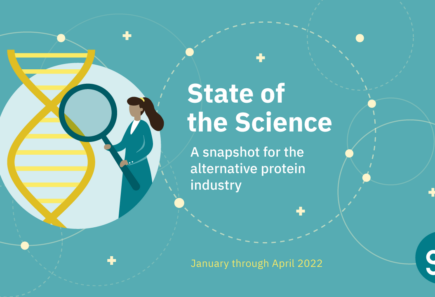
The State of the Science on Alternative Proteins: January through April, 2022
Liz Specht, PhDA new resource series covering alt protein technology and developments in the broader scientific ecosystem

A new resource series covering alt protein technology and developments in the broader scientific ecosystem

In our guide, you’ll learn about the steps needed to raise awareness and excitement about alternative proteins throughout your university.

In recognition of the U.N.’s International Day of Biological Diversity, a GFI staffer shares her path to this moment and the people and places that have shaped her along the way.

Protein Innovation Nation is a monthly newsletter covering local and national updates around public research funding, regulation, legislation, and labeling. Hear the latest on key market updates, new reports, and opportunities at GFI.
To expand the technical talent pipeline, various players in the alternative protein field should reach out to scientists and engineers in relevant disciplines (e.g., biotech, biopharma, and food science) to inform them of opportunities to apply their existing expertise to this field. Efforts should target students and seasoned professionals.
To date, no robust environmental assessments have been conducted to compare alternative seafood to its conventional counterparts. An open-access, quantitative analysis of the relative environmental impacts of alternative seafood will help garner support for the industry from policymakers, nonprofit organizations, consumers, investors, foodservice outlets, and retailers.
As the leading global trade fair, Anuga FoodTec is the most important source of impetus for the international food and beverage industry.
This show is the largest annual gathering of foodservice professionals in the Western Hemisphere, bringing together tens of thousands of restaurant, foodservice, and hospitality industry leaders from around the world. Visit GFI in the exhibition hall!

GFI's Dr. Liz Specht explains how eating meat made from microbes could stave off half the world’s deforestation — but at a certain point, the land-saving effect is diminished.
The Material Innovation Conference aims to advance the next-gen materials industry by providing vital expertise and bringing together all key players along the innovation path from concept to commercialization.